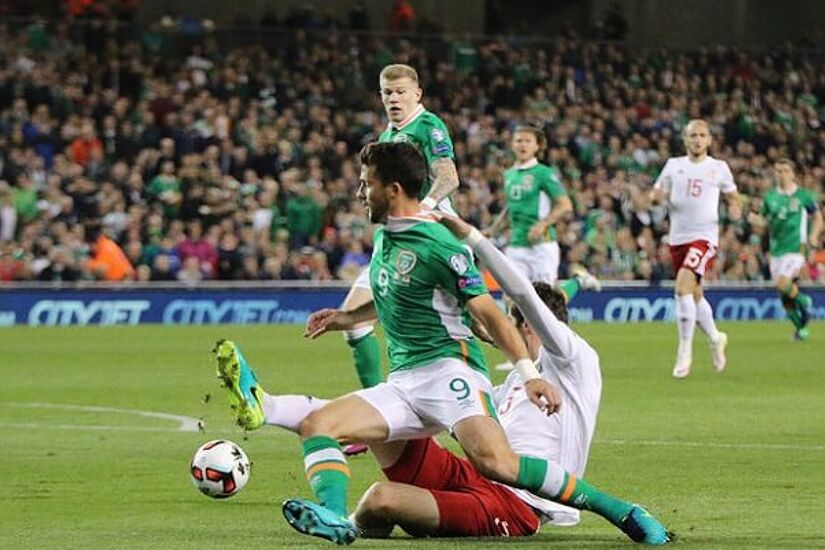A Profile of Ireland's next opponents - Moldova

Credit: Matt Kirkham (ETPhotos)
Martin O’Neill’s Republic of Ireland side head to Moldova to take on the locals as World Cup 2018 Qualification Group D moves into its third round of matches. So, what can we expect from Moldova and what challenges should the side ranked 161 in the official FIFA rankings (Georgia are at no. 137, Ireland are 30th) pose to an Irish side in the first meeting between the two countries? Extratime.ie’s Michael Hanley takes a closer look.
Group D hasn’t started well for Moldova, a 4-0 defeat on the opening night in Cardiff was followed up with them been on the wrong end of a 3-0 thumping at home to a confident Serbian side last Thursday night in the Zimbru Stadium in the Romanian speaking nation’s capital Chisinau. Moldova have only one victory in their last 24 games, a 1-0 friendly win over Andorra earlier this year has been as good as it has got for the landlocked country of 3.5 million people that sits between the Ukraine and Romania. Their most recent qualification campaign for Euro 2016 saw them finish winless and bottom on two points behind Liechtenstein in a group that saw Austria and Russia qualify for France as well as Sweden who went through via the playoffs.
Two one all draws against Liechtenstein and a creditable result away at Russia were all Moldova had to show for their efforts, however it was the 1-0 home defeat against Liechtenstein in November 2014 that stands out as a particular low point.
A look at the Moldovan squad sees 19 of the 23 players called up for the Serbia and Ireland games playing domestically in the Moldovan league. Their captain and most capped player Alexandru Epureanu who plays his football with Istanbul Basaksehir is one of the four who started against Serbia who play outside Moldova.
Two midfielders, Alexandru Gatcan and Eugeniu Cebotrau play in the Russian Premier League with Rostov and Sibir Novisibirsk whilst the goalkeeper Cebanu plays in the Russian Second League. The manager Igor Dobrovolski who won 25 caps for the USSR and had a spell with Athletico Madrid as a player is back at the helm for a second time having also managed the side from 2007-2009.
Having scored only 4 goals in the 2016 qualifying campaign this is clearly an area Moldova struggle, 32 year old Igor Bugaiov a journeyman striker through the lower echelons on the Ukrainian and Romanian leagues led the line against Serbia but with 7 goals in 45 international appearances it looks remote that fortunes in this department will improve soon
The Moldovan league is ranked 34th by UEFA compared to the League Of Ireland in 37th (up from no.41 last season thanks primarily to the efforts of Stephen Kenny and co. in Oriel Park) and given that the Moldovan squad is largely drawn from a domestic pool of players this is a good barometer for how to gauge the ability of the squad.
Sheiff Tirasspol, beaten in the Champions League first qualifying by Israel’s Hapoel Be’er Sheva and have won eleven of the last 12 Moldovan championships are certainly an interesting side. They play in a region called Transnistria, this is a self-declared, breakaway republic comprising of a 20km wide sliver of land on the east banks of the Dniester river on the Moldovan-Ukrainian border that has lived in virtual isolation from the rest of the world after a failed war of independence with Moldova exactly 22 years ago.
It has in that time become a haven for smugglers and gun-runners and is recognized only by Russia. Sheriff who play in a state of the art stadium funded by a Russian billionaire provide 4 players to the squad although one can be certain that no Sheriff supporters will be making the trip to Chisinau to cheer on the side against Ireland on Sunday evening
Moldova have never qualified for a major tournament, following the breakup of the Soviet Union they played their first international in July 1991.
Their first foray into competitive football was the qualification rounds for the 1996 European Championships where they recorded two of their most famous results, a 3-2 win over Wales in November 1994 in Chisinau and a 1-0 win in Tblisi against Georgia .
Sunday’s game will be played in the 10,400 capacity Zimbru stadium in the nation’s capital, opened in 2006 it was sparsely populated with fewer than the 4000 in attendance against Serbia last Thursday.
St Patrick’s Athletic fans won’t have good memories of this city after the qualifiers for the 1999/2000 Champions League, a 5-0 defeat in Chisinau against Zimbru was followed up with another 5-0 defeat in Inchicore to take the aggregate defeat into double figures
The small band of Irish fans who make their way to this corner of Eastern Europe on Sunday will be hoping for a much different outcome and that we come away with another vital three points to keep us on track for Russia 2018.

